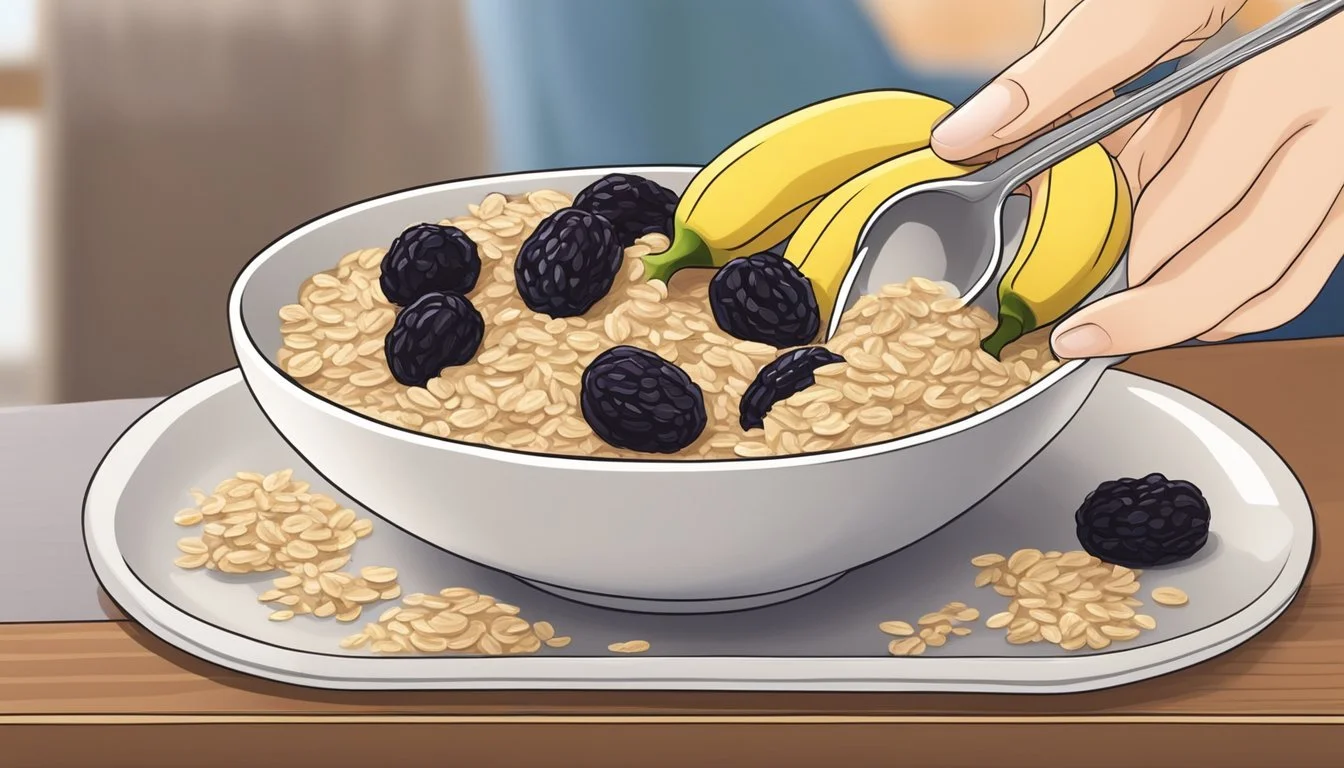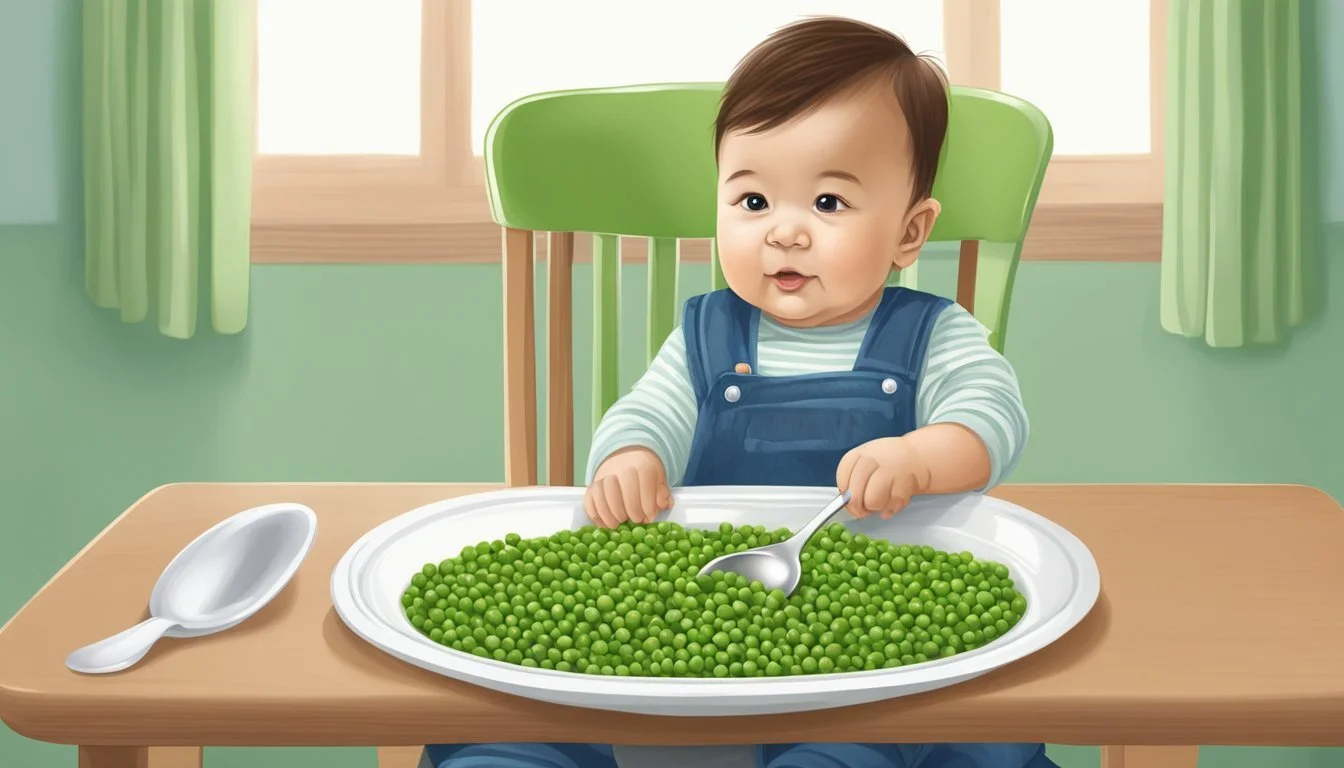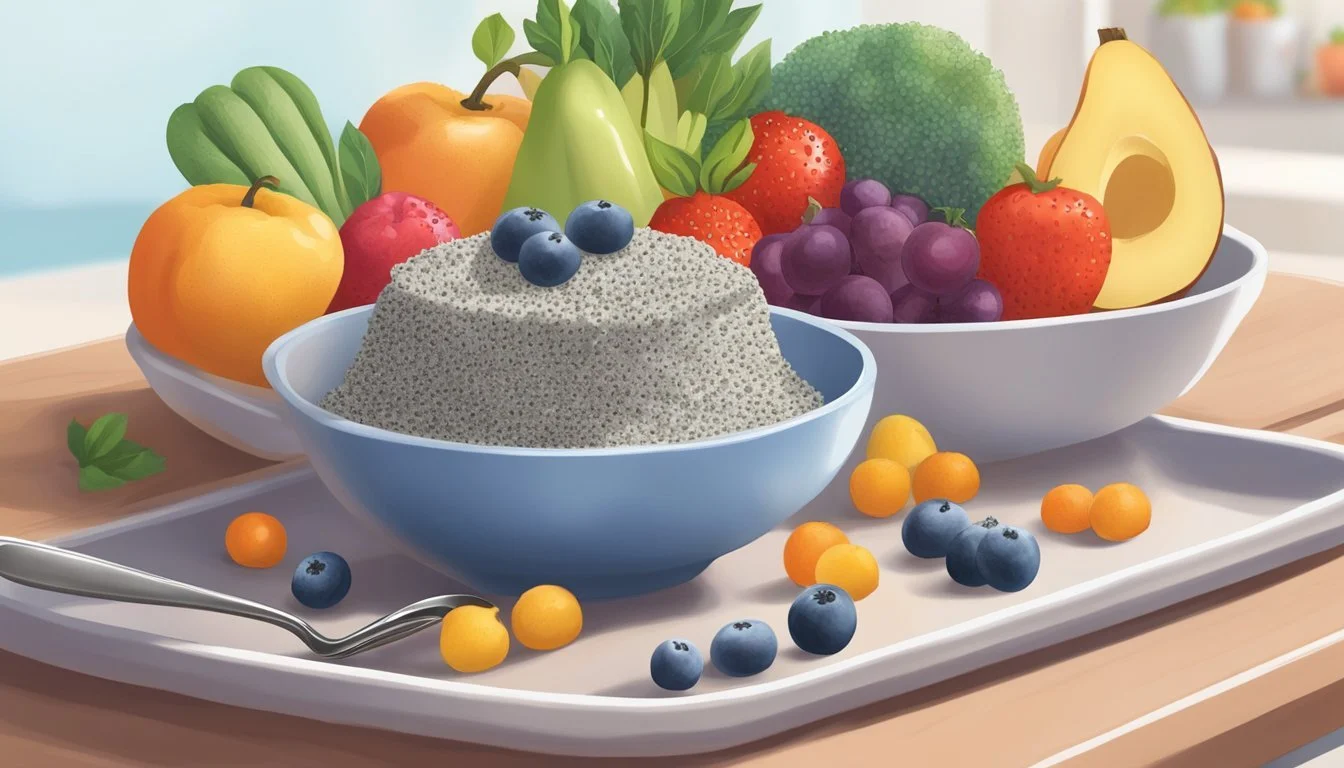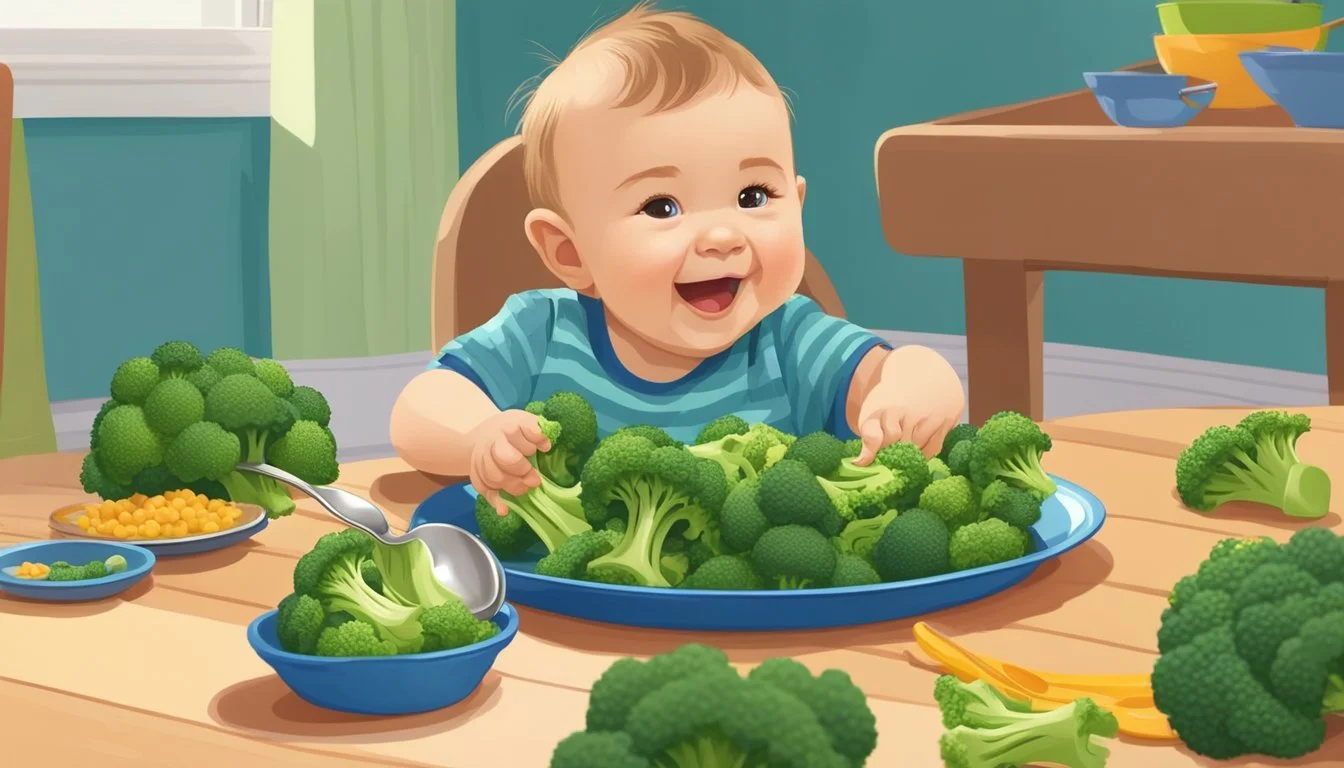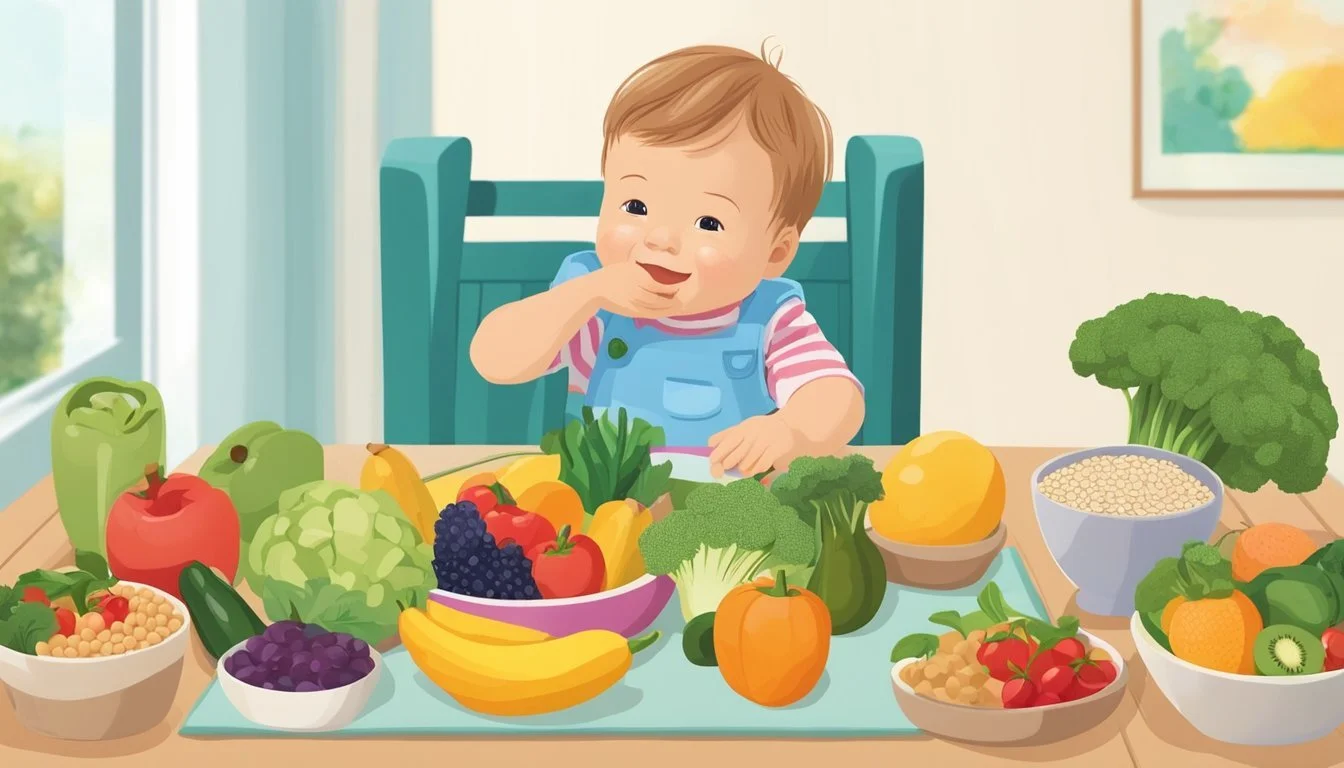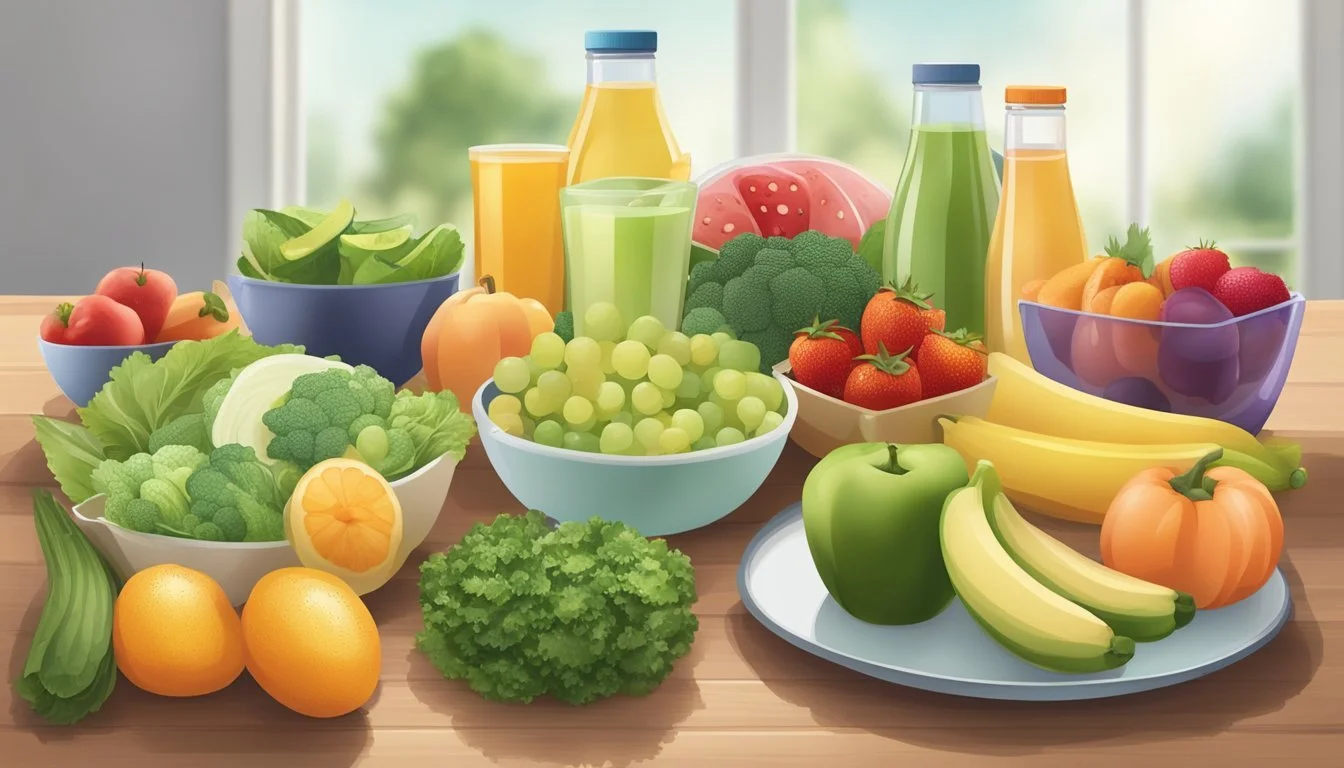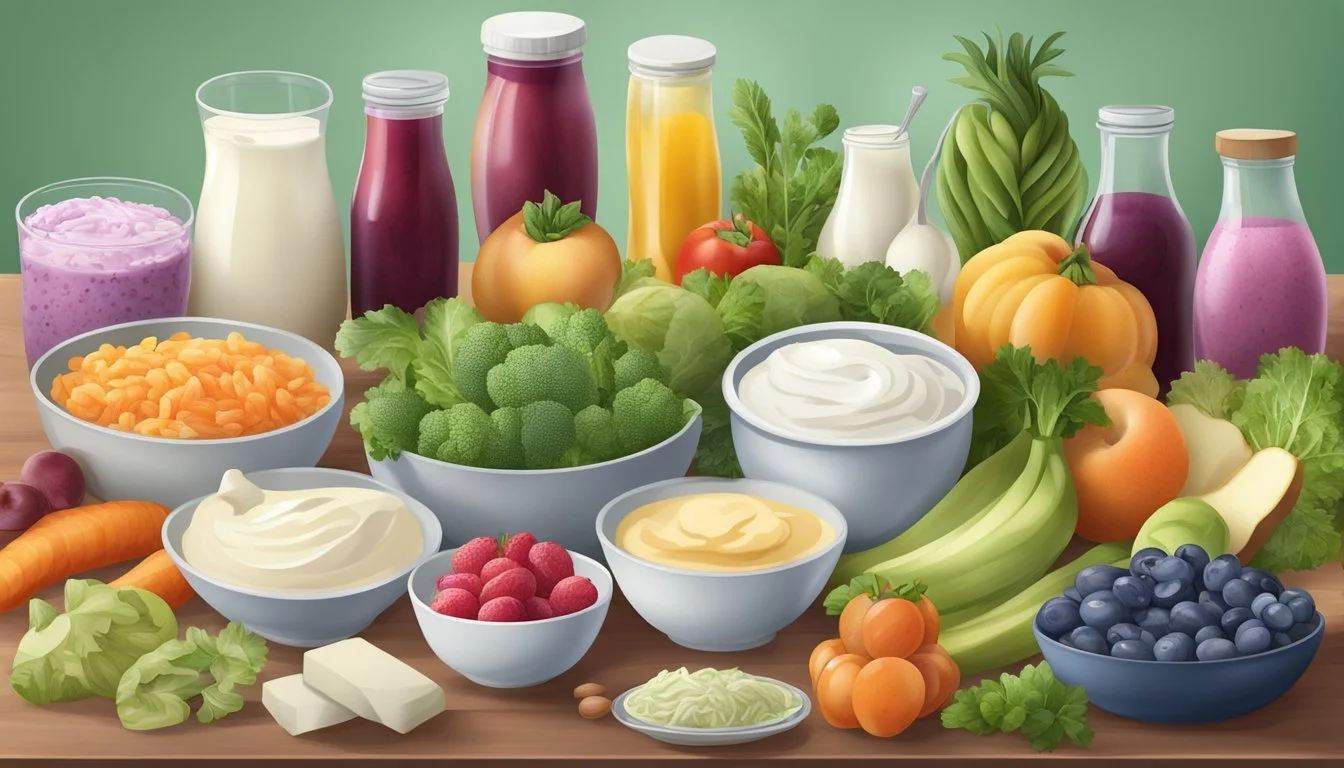Toddler-Friendly Foods to Ease Constipation in Your 18-Month-Old
For parents of 18-month-old toddlers, managing dietary needs is crucial, especially when dealing with constipation. Knowing which foods can help your child have regular bowel movements can significantly improve their comfort and overall health.
Certain foods can effectively promote bowel regularity in toddlers. Understanding which foods to introduce or incorporate more into meals can make a considerable difference. This article will explore practical dietary options to help your toddler maintain healthy digestion.
1) Prune Puree
Prunes are a natural remedy for relieving constipation in toddlers. They are rich in fiber and sorbitol, which help soften stools and promote bowel movements. Prune puree is a simple, effective way to include this beneficial fruit in an 18-month-old's diet.
To make prune puree, soak prunes in hot water for about 10 minutes. This helps to soften them, making them easier to blend.
Add the softened prunes to a blender, using a slotted spoon. Blend until smooth, adding water in small increments to achieve the desired consistency. The puree can be as thick or smooth as needed, depending on your child's preference.
Prune puree can be served on its own or mixed with other pureed fruits, such as apples or pears. This not only enhances the flavor but also increases the nutritional content.
Including prune puree in an 18-month-old's diet can help maintain regular bowel movements. It is a natural, gentle solution for constipation that can be easily prepared and incorporated into various meals and snacks.
2) Pear Juice
Pear juice is effective in helping an 18-month-old alleviate constipation. Pears contain high levels of fiber and sorbitol, both of which are key in promoting bowel movements. Fiber helps to bulk up the stool, making it easier for the child to pass stools.
Sorbitol, a natural sugar found in pears, acts as a mild laxative. It draws water into the intestines, softening the stool and aiding in easier passage. Pear juice can be offered in small amounts, and its gentle properties make it a suitable remedy for young children.
It's essential to ensure the juice is 100% pure without added sugars or artificial ingredients. Added sugars can sometimes worsen constipation. Half a cup of pear juice once a day should suffice to keep things moving smoothly.
Parents can include pear juice in their toddler's diet along with other solid foods. It can be given as a drink or mixed with other foods if the child prefers. Ensuring the drink is served at room temperature or slightly warm can also aid in its effectiveness. Adjust the quantity based on the child's response and pediatrician's advice.
3) Apple Sauce
Apple sauce is a beneficial food to help an 18-month-old relieve constipation. Made from cooked apples, it retains a good amount of dietary fiber, especially if the skins are included during cooking.
The fiber in apple sauce can help pull water into the colon, softening the stool and making it easier for the child to pass.
When offering apple sauce to a toddler, ensure it is unsweetened to avoid unnecessary sugar intake. Pairing it with other fiber-rich foods can enhance its effectiveness.
For added nutritional benefits, homemade apple sauce is simple to prepare. Simply cook peeled apples until soft and then puree to the desired consistency.
Consistent inclusion of apple sauce in the child's diet can promote regular bowel movements, contributing to overall digestive health.
4) Oatmeal
Oatmeal is a great food to help relieve constipation in 18-month-old children. It is rich in fiber, which plays a crucial role in promoting healthy digestion. The soluble fiber in oatmeal absorbs water, making stools softer and easier to pass.
Preparing oatmeal is simple and quick. It can be cooked with water or milk to give it a pleasant texture. Adding a small amount of fruit, like apples or pears, can boost its fiber content even further.
In addition to its digestive benefits, oatmeal provides essential nutrients like iron and B vitamins. These nutrients support your child’s overall health and development. Be sure to use whole oats rather than instant varieties to maximize its fiber benefits.
5) Flaxseed Meal
Flaxseed meal can be an effective remedy for constipation in 18-month-old toddlers. It is a natural source of fiber, which helps regulate bowel movements and encourages healthy digestion.
When adding flaxseed meal to a toddler's diet, it's important to start with small amounts. About 1/8 teaspoon mixed into foods like oatmeal or yogurt can be a good starting point.
As the toddler becomes accustomed to the taste and texture, the amount can be gradually increased. Around 1/4 to 1 teaspoon per serving is often sufficient for maintaining regular bowel movements.
Parents can also add flaxseed meal into smoothies, making it nearly unnoticeable for picky eaters. This can be a convenient way to incorporate it without altering the flavor of the favorite foods.
It's worth noting that flaxseed meal should be stored in a cool, dark place to maintain its nutritional benefits. Freshly ground flaxseed is preferred to pre-ground flaxseed, which can lose potency over time.
In addition to relieving constipation, flaxseed meal provides omega-3 fatty acids, which support overall brain and heart health. Always consult with a pediatrician before making significant changes to a child's diet.
6) Peas
Peas are an excellent choice for helping an 18-month-old with constipation. They are rich in dietary fiber, which aids in digestion and helps to keep bowel movements regular. The natural fiber content in peas helps to soften the stool, making it easier for the child to pass.
In addition to fiber, peas are also a good source of essential vitamins and minerals such as vitamin C, vitamin K, and folate. These nutrients support overall digestive health and contribute to the smooth functioning of the digestive system.
Peas can be easily incorporated into a toddler's diet. They can be served as a finger food, mixed into casseroles, or blended into purees. Steaming peas can preserve their nutrients while making them soft and easy for your child to chew and swallow.
For variety, peas can be combined with other fibrous vegetables like carrots or served alongside lean proteins. This can create a balanced meal that supports both digestion and growth. Always ensure that peas are cooked thoroughly to avoid any choking hazards.
Introducing peas as a regular part of your child's diet can be a simple and effective way to alleviate constipation and maintain healthy digestion.
7) Sweet Potatoes
Sweet potatoes are an excellent option for helping an 18-month-old alleviate constipation. They are high in dietary fiber, which aids in bowel movements and keeps stools soft.
The natural sweetness of sweet potatoes can appeal to young children, making it easier for parents to include them in meals. They can be baked, steamed, or mashed, providing versatile preparation options.
Including the peel of the sweet potato can boost fiber content even further. Parents can try offering baked sweet potato fries or roasted sweet potato cubes as delicious snacks.
Adding sweet potato puree to soups or mixing it with other vegetables can be another way to integrate this beneficial food into a child's diet. This vegetable is not only nutritious but also easily digestible for young stomachs.
8) Butternut Squash
Butternut squash is a nutritious and effective food to help relieve constipation in an 18-month-old. It is high in fiber, which promotes healthy bowel movements.
Roasting or steaming butternut squash is simple and brings out its natural sweetness. These preparation methods make the squash soft and easy for toddlers to eat.
To prepare, cut the squash in half, remove the seeds, and roast until tender. Steaming until soft is another quick method. Both methods preserve its nutrients.
Butternut squash can be served as finger food, mashed, or pureed. These different textures make it suitable for various stages of a toddler’s eating development. Including it regularly can contribute to better digestive health.
9) Apricots
Apricots are a nutritious choice to help ease constipation in an 18-month-old. These fruits are rich in dietary fiber, which promotes healthy digestion and aids in bowel movements.
Offering apricots in their natural form, whether fresh or dried, can be beneficial. Dried apricots, in particular, have higher fiber content compared to fresh ones.
To prepare, apricots can be chopped into small, bite-sized pieces that are easy for a toddler to chew and swallow. For dried apricots, consider soaking them in water to soften before serving. This makes them easier to digest and helps prevent any choking hazards.
Apricot puree is another toddler-friendly option. Simply blend fresh apricots with a bit of water until smooth. This puree can be eaten on its own or mixed into other foods like yogurt or oatmeal.
Another way to incorporate apricots into a child’s diet is by adding them to smoothies. Blending apricots with other fruits like bananas can create a tasty and fiber-rich drink.
Introducing apricots can be a gentle yet effective approach to helping an 18-month-old maintain regular bowel movements.
10) Plums
Plums are a beneficial food for helping children with constipation.
These fruit contain both soluble and insoluble fiber, which can help regulate bowel movements.
Soluble fiber absorbs water and forms a gel-like substance, making stools softer.
Insoluble fiber adds bulk, aiding in the smooth passage of stools through the digestive system.
For an 18-month-old, small pieces of ripe plums can be offered as a snack.
Ensure the plum is cut into appropriate sizes to prevent choking.
Plum puree can also be added to other foods or given directly to the child.
Plum juice is another option, though it is advisable to limit juice intake to prevent excessive sugar consumption.
Mixing plum puree with yogurt or cereal can make it a more appealing option for toddlers.
Additionally, incorporating plums into the diet can introduce essential vitamins and minerals such as vitamin C and potassium.
Regularly offering plums, along with other fiber-rich foods, can help maintain healthy digestion.
Parents should monitor their child's reaction to plums and consult a pediatrician if any adverse effects occur.
Overall, plums can play a key role in relieving constipation in young children through their natural fiber content and ease of preparation.
11) Whole Wheat Bread
Whole wheat bread is an excellent source of dietary fiber, which can help an 18-month-old with constipation. Fiber promotes healthy digestion by adding bulk to the stool, making it easier to pass.
Choosing 100% whole-wheat bread ensures the highest fiber content. Each slice typically contains 2 to 3 grams of fiber. This can be integrated into meals conveniently, such as in sandwiches or toast.
Pairing whole wheat bread with other fiber-rich foods like vegetables or beans can further boost fiber intake. Simple additions like avocado or hummus can enhance both the taste and nutritional value.
Make sure to serve whole wheat bread alongside sufficient fluids, particularly water, to help keep the stool soft. Proper hydration is essential for fiber to effectively relieve constipation.
Introducing whole wheat bread gradually can help your child get accustomed to its taste and texture. This makes it easier to incorporate into their regular diet.
12) Chia Seeds
Chia seeds are an excellent option for aiding digestion and alleviating constipation in toddlers. These tiny seeds are rich in both soluble and insoluble fibers, which help to regulate bowel movements.
Two tablespoons of chia seeds provide about 7 grams of fiber. This high fiber content can help keep an 18-month-old's digestive system moving smoothly.
Chia seeds also contain mucilage, a type of soluble fiber that forms a gel-like consistency when soaked in water. This gel can ease the passage of stool, making it an effective natural remedy for constipation.
It's advisable to serve chia seeds that have been soaked in water or other liquids. Soaking helps them expand and become easier to digest, reducing any potential choking hazards for toddlers.
Incorporating chia seeds into a child's diet can be as simple as mixing them into yogurt, oatmeal, or smoothies. These seeds have a mild flavor, making them versatile and easy to add to various foods.
When introducing chia seeds to an 18-month-old, it's important to start with small amounts and ensure they are well-hydrated to avoid any digestive discomfort.
Chia seeds can also be combined with other high-fiber foods to create a balanced, fiber-rich diet that supports healthy bowel movements.
13) Broccoli
Broccoli is a high-fiber vegetable that can aid in relieving constipation in an 18-month-old. The fiber content in broccoli helps to bulk up stools, making them easier to pass.
It is best served steamed to retain most of its nutrients. Small, bite-sized pieces are ideal for young children, who may find it easier to chew and swallow.
Broccoli also contains important vitamins and minerals which contribute to overall gut health. Not only does it help with constipation, but it also provides essential nutrients for a growing child.
14) Cauliflower
Cauliflower is a versatile vegetable that can aid in relieving constipation in 18-month-old children. High in fiber, cauliflower helps to increase stool bulk and promote regular bowel movements.
For a simple preparation, steam cauliflower until soft. This can be easily mashed or pureed for easier consumption by toddlers.
Roasting cauliflower is another option. Roasting can enhance its flavor and make it more appealing as finger food for older toddlers. Ensure the pieces are small and cooked until tender.
Cauliflower can be mixed with other vegetables or added to dishes like soups and stews, making it a flexible addition to a child's diet. It's important to introduce cauliflower gradually to monitor any potential digestive discomfort.
Incorporating cauliflower into meals provides a natural way to support digestive health and alleviate constipation in young children.
15) Spinach
Spinach is a highly nutritious vegetable that can help alleviate constipation in 18-month-old toddlers. Rich in fiber, it helps promote healthy bowel movements by adding bulk to the stool and aiding its passage through the digestive system.
The leafy greens are also packed with essential vitamins and minerals, such as vitamin C, vitamin K, and iron, which are beneficial for overall health. Introducing spinach into a child's diet can be as simple as pureeing it into soups or smoothies.
Cooked spinach is often easier for young toddlers to digest compared to raw spinach, which could be a bit tough. Steamed or sautéed spinach can be blended with other baby-friendly foods like sweet potatoes or apples to enhance the flavor and texture.
Parents should ensure that spinach is well cooked and chopped into small, manageable pieces to reduce any choking hazard. Offering spinach a couple of times per week can be an effective way to help an 18-month-old maintain regular bowel movements.
16) Yogurt
Yogurt is a beneficial food for helping an 18-month-old with constipation. It contains probiotics, which are live bacteria that promote a healthy digestive system.
These probiotics help balance the gut flora, making it easier for the digestive tract to process food and pass stool more effectively.
Choosing plain, unsweetened yogurt is crucial, as added sugars can aggravate constipation. Combining yogurt with fibrous fruits can further aid digestion.
Consider mixing in small amounts of puréed fruits like prunes or pears. This not only enhances the flavor but also boosts fiber intake.
Offering yogurt as a snack or part of meals can be a simple and effective way to support a toddler's digestive health.
17) Beans
Beans are a high-fiber food that can help alleviate constipation in an 18-month-old. Most beans, such as black beans, kidney beans, and lentils, are excellent sources of both soluble and insoluble fiber. This combination promotes healthy bowel movements by adding bulk to the stool and helping it pass more easily.
Introducing beans into a toddler's diet can be quite simple. They can be mashed and mixed with rice, added to soups, or pureed into spreads. It's important to ensure that the beans are thoroughly cooked and soft to avoid choking hazards.
While beans are beneficial, they can sometimes cause gas, which may be uncomfortable for some children. Gradually introducing small amounts of beans can help the digestive system adjust, minimizing any potential discomfort.
Offering a variety of beans can also ensure that the child receives a broad spectrum of nutrients. In addition to fiber, beans provide essential proteins, vitamins, and minerals, making them a nutritious addition to a balanced diet.
Always ensure that beans are prepared safely and are free from any added salt or spices that might not be suitable for young children.
18) Lentils
Lentils are a great source of dietary fiber, which is important for healthy digestion in young children.
They help in promoting regular bowel movements due to their high fiber content. These legumes are also rich in essential nutrients like iron, protein, and vitamins.
To prepare lentils, combine one cup of lentils with three cups of water in a pot. Bring the mixture to a boil, then reduce the heat and cover the pot with a lid. Cook for about 20 to 30 minutes until the lentils are tender.
Incorporating lentils into your child's diet can be simple. They can be added to soups, stews, or pureed into a smooth texture suitable for toddlers. Make sure the lentils are soft and well-cooked to prevent any choking hazards.
Dietary Fiber and Its Role
Understanding dietary fiber and its types can help parents ensure their toddler gets sufficient amounts for healthy digestion. This age group has specific fiber needs that must be met to promote regular bowel movements and prevent constipation.
Types of Dietary Fiber
Dietary fiber is categorized into two types: soluble fiber and insoluble fiber.
Soluble fiber dissolves in water and forms a gel-like substance. It can help soften stools, easing their passage. Foods rich in soluble fiber include oats, apples, and pears.
Insoluble fiber does not dissolve in water. It adds bulk to the stool, aiding in faster movement through the digestive system. Whole grains, nuts, and vegetables like carrots are excellent sources of insoluble fiber.
Each type of fiber plays a crucial role. Incorporating a mix of both can help maintain digestive health in toddlers.
Recommended Fiber Intake for Toddlers
For toddlers aged 18 months, the appropriate amount of fiber is generally calculated as their age plus five grams.
Thus, an 18-month-old should consume around 6.5 grams of fiber daily. Parents should gradually introduce fiber-rich foods to avoid any digestive discomfort.
High-fiber foods suitable for toddlers include fruits like apples and pears, vegetables such as green peas and carrots, and whole grains like oatmeal and brown rice.
By ensuring a balanced intake, parents can help their toddlers maintain regular bowel movements and overall digestive health.
Hydration is Key
Proper hydration is essential for ensuring healthy bowel movements in toddlers. Adequate fluid intake helps soften stool, making it easier to pass and reducing the risk of constipation.
Importance of Fluids
Fluids play a vital role in maintaining bowel health. They help move waste through the digestive system efficiently. Without enough fluids, stools can become hard and difficult to pass, leading to constipation.
Regular consumption of fluids is crucial as it keeps the digestive system well-lubricated. This is particularly important for toddlers who are transitioning from breast milk or formula to solid foods.
Offering water regularly throughout the day can help maintain hydration levels. Additionally, fluids like breast milk, formula, and diluted fruit juices can contribute to overall fluid intake, promoting easier bowel movements.
Best Hydration Options for Toddlers
Water: The simplest and most effective way to hydrate a toddler. Aim to offer small amounts frequently, especially between meals.
Diluted Fruit Juices: Small quantities of apple or prune juice can be helpful. These juices contain natural sugars that can help stimulate bowel movements.
Breast Milk or Formula: For toddlers still breastfeeding or using formula, these liquids continue to be excellent sources of hydration.
Hydration-Rich Foods: Foods with high water content, such as watermelon, cucumber, and strawberries, can also contribute to fluid intake. Offering these foods as snacks can be an effective way to boost hydration.
Avoid Sugary Drinks: Drinks high in sugar can dehydrate and should be limited. Stick to water, milk, and natural juices for the best results.
Probiotics and Gut Health
Introducing probiotics into an 18-month-old's diet can positively impact gut health and alleviate constipation. There are many sources of probiotics that are safe for toddlers and can provide various benefits to their gut microbiome.
Sources of Probiotics Suitable for Toddlers
Yogurt is a popular source of probiotics for young children. Look for varieties that contain live and active cultures, like Lactobacillus acidophilus and Bifidobacterium lactis. Ensure that the yogurt is low in sugar and free from artificial additives.
Kefir is another dairy product rich in probiotics. It can be consumed as a drink and comes in plain or flavored options. Plain kefir is preferable for reducing sugar intake.
Fermented foods such as sauerkraut and kimchi can be introduced in small amounts. Opt for varieties that are raw and unpasteurized to ensure they contain live cultures.
Probiotic supplements designed for children are also available. Products like Garden of Life RAW Probiotics Kids, which include billions of live probiotic cells, are suitable for babies and toddlers.
Benefits of a Healthy Gut Microbiome
A balanced gut microbiome aids in digestion and can help prevent constipation. Certain strains of probiotics, like Lactobacillus reuteri and Bifidobacterium infantis, are shown to improve bowel movements and alleviate discomfort in young children.
Probiotics also support the immune system. By maintaining a healthy balance of bacteria in the gut, they help fend off harmful pathogens and reduce the incidence of infections, such as those causing diarrhea.
Introducing probiotics can enhance nutrient absorption. This ensures that toddlers get the most benefit from the vitamins and minerals in their diet, aiding overall growth and development.



